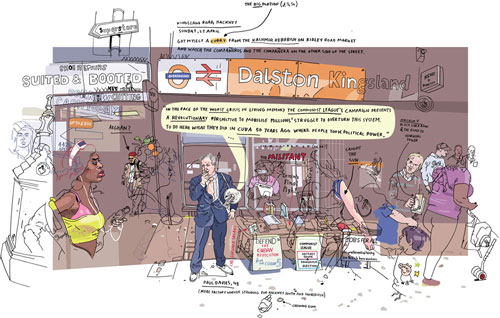

Vol. 74/No. 20 May 24, 2010

|
| Olivier Kugler/www.olivierkugler.com |
| Above is part of two-page spread of drawings on UK elections by Olivier Kugler published in Guardian newspaper May 4. Depicted here is Communist League candidate Paul Davies campaigning on street. Entire piece can be viewed at: http://www.olivierkugler.com/c92/index.html |
The event was organized to celebrate the allied victory in World War II—the second world imperialist slaughter. In Edinburgh, Scotland, on the same day, hundreds of troops returning from Afghanistan marched through the city center. The event was organized to salute 30 soldiers who lost their lives over the last six months in Afghanistan.
The message was clear. Britain’s “national interests”—in the face of war and the deepest economic crisis in living memory—are being defended as the three party leaderships maneuver for position following the results of the general election two days earlier. No party attained a parliamentary majority in the election, resulting in the first “hung parliament” since 1974.
The Conservative Party won the largest number of seats, securing 306, considerably short of the 326 needed for an outright majority. Labour finished with 258 Members of Parliament (MPs), down 91 from the previous election; the Liberal Democrats secured 57, down five; and other parties obtained 28.
The vote reflects the crisis of bourgeois leadership in the face of gigantic challenges for British capitalism. Britain’s rulers are weighing the prospect of the biggest budget deficit in Europe.
The UK’s ruling families in the main backed the Labour government under Anthony Blair and initially backed the Brown government’s response to the financial crisis, including its £1 trillion (US$1.5 trillion) worth of bailout packages.
But they have, for some time, considered a Brown-led Labour government ill-equipped to tackle the consequences, unable to carry through the sort of attacks on the living standards of working people that they deem necessary.
The rulers began to shift their preference to the Conservative Party under its new leader, David Cameron. In an effort to rekindle the Conservative Party’s electoral fortunes and take advantage of the rulers’ shift away from Labour, Cameron presented himself as the “heir to Blair.” Five prominent publications ended the support they’d given to the Labour Party in the 2005 election. Cameron was endorsed by the Sun, the Times, and Financial Times daily newspapers, and the Economist magazine. The daily Guardian endorsed the Liberal Democrats.
All three parties went into the election with the message that cuts in social welfare would be necessary. But the more radical language of the Tories, who spoke of an “age of austerity,” and the Liberal Democrats, who forecast “savage cuts,” resulted in Labour not suffering the kind of electoral wipeout that some in the media had predicted, especially in areas where the working class has already been hard hit by the economic crisis.
In Scotland, the Labour vote held up, with the Liberal Democrats coming in second and the Tories fourth, with just one MP elected. The Labour Party also faired well in Wales and the north of England and won back a number of local councils that the party had lost over recent years.
Right-wing parties benefited from the crisis of leadership and disaffection of millions from the main parties. Pumping up the politics of resentment, the UK Independence Party won 900,000 votes—up 50 percent from 2005—and the British National Party tripled its vote from 2005, standing 339 candidates and winning 560,000 votes.
Coalition government formed
The Conservatives have, after days of haggling, finally managed to establish a coalition government with the Liberal Democrats, with Tory leader David Cameron as prime minister.
Speaking on BBC television at the outset of the negotiations, Michael Portillo, former Conservative cabinet member in Margaret Thatcher’s government, argued that such a coalition government was “very possible” as the size of the government debt and “market forces” would decide government policy.
In an effort to secure an alternative Labour-Liberal pact, representing a so-called “progressive majority,” Prime Minister Brown announced his resignation as Labour Party leader. But the Labour-Liberal deal foundered in the face of opposition within the Labour Party and upon the recognition that it would itself not command a parliamentary majority. The capitalist media roundly condemned what many called a “coalition of the losers.”
“Whatever differences between the Tories and Liberal Democrats, the government that has emerged will lead an assault on jobs and welfare,” said Paul Davies, who stood as the Communist League candidate in Hackney South and Shoreditch. “They’ll have backing from the Labour Party leadership in their efforts to secure British imperialism’s place in the world. The capitalist party leaders speak of acting in the ‘national interest’ in an attempt to draw working people into their schemes. But what they mean by ‘national interest’ are the interests of the capitalist rulers. Workers must act to defend their own class interests.”
Front page (for this issue) |
Home |
Text-version home